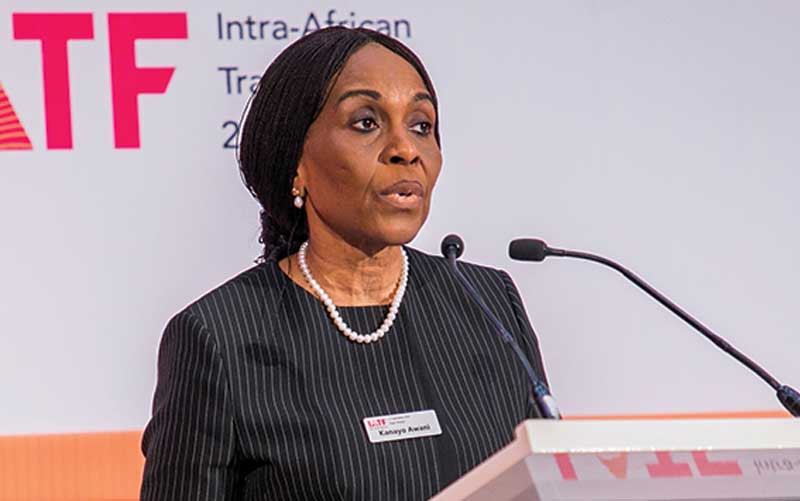
THE African Export-Import Bank (Afreximbank) has brought a sigh of relief to many African filmmakers with a US$1 billion support set to breathe life into the African film industry.
Afreximbank has announced the establishment of a US$1bn African Film Fund to be launched next year to support the continent’s film industry which has always yearned to tell stories that are authentically African yet relatable and enjoyable not just to Africans, but filmmakers have been hamstrung by funding challenges.
The Intra-African trade bank executive vice-president at Afreximbank Kanayo Awani, revealed the latest developments last week on Friday in Cairo, Egypt while addressing the opening session of the seven-day 2023 Creative Africa Nexus (Canex) summit.
The ongoing summit held as part of the third Intra-African Trade Fair (IATF2023), Africa’s largest trade and investment fair opened on November 9 and will run until Wednesday this week.
The Canex summit is an Afreximbank initiative which seeks to facilitate the development and growth of the creative and cultural industries in Africa and the diaspora.
The programme provides a range of financing and non-financing instruments and interventions aimed at supporting trade and investment in Africa’s creative sector.
Awani said the bank had increased the financing to the creative sector from US$500 million to US$1bn and that the bank currently had a pipeline of over US$600 million in film, music, visual arts, fashion and sports projects.
The US$1 billion fund would oversee film financing, co-finance with large studios, finance African filmmakers and finance producers and directors of film projects across the continent.
- MIHR petitions govt on Lubimbi relocations
- ‘Timely IMF boost saved Zim’
- In Full: Twelfth post-cabinet press briefing: May 10, 2022
- Blocked funds choke NMB
Keep Reading
“The very first film we financed recently premiered at the Toronto Film Festival. The bank has several films in the pipeline from Nigeria, South Africa and Kenya, which should be on streaming platforms in 2024,” she noted.
Awani revealed that the film and audiovisual industries in Africa accounted for US$5 billion of the continent’s gross domestic product (GDP) and employed an estimated five million people, with the potential to create over 20 million jobs and generate US$20 billion in revenue annually.
She also noted that the sector faced several challenges, including copyright infringement due to weak copyright laws, enforcement mechanisms and a lack of awareness.
“The sector was also confronted with infrastructure and technology gaps, lack of capacity and shortage of skilled professionals and limited market access and international exposure, as a result of which African creative and cultural products often struggle to gain exposure and access to international markets,” she noted.
Earlier, Boris Kodjoe, a celebrity actor of Ghanaian descent highlighted how the creativity of Africans had influenced various aspects of modern life, including music, fashion, art, design, social consciousness, business, sports, film and television.
“The exploitation of black creativity by the West has had lasting effects and that, despite admiration of black excellence, Africa still faced branding challenges due to external perception fuelled by the traditional media’s depiction of poverty, famine, civil wars and migration on the continent,” he noted.
Kodjoe said the world craved culturally specific global content and that Africa was a key player in meeting that demand.
Given the continent’s young population and high connectivity, studios, networks, promoters and brands were investing in solutions to reach diverse audiences.
“Films and television shows with diversity performed better than others by 30% and Afrobeats was taking over global airwaves.”
By 2030, Africa is projected to produce up to 10% of global creative export goods worth roughly US$200 billion or 4% of Africa’s GDP.
Speaking at the same summit, commissioner for trade and industry of the African Union Commission, Albert Muchanga said the creative sector in Africa was rapidly growing and making a significant contribution to the inclusive growth and sustainable development of African economies.
“I reaffirm my belief that the African creative industry has huge potential to be a source of employment and revenue to create the Africa we want, revenue from intra-African trade as well as revenue from the rest of the world,” he noted.
Muchanga urged African nations to convert their vast potential into plans and projects which yield tangible results, stressing the need to also invest in protecting international property rights.
The Canex summit intends to further develop conversations and provide additional business-to-business and business-to-government opportunities.
It includes a fashion show featuring a range of bold and exciting designs from across Africa and the diaspora and a Canex Music Factory, hosted by renowned South African producer Oskido, which provides songwriters and beat makers the opportunity to record their work.







